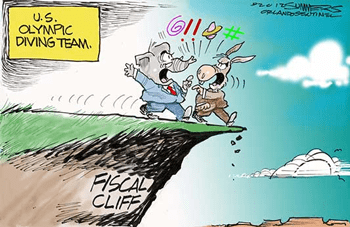Women & Work
The Young Politica: The Growing Debate On Unpaid Internships
Internships are awesome. They look great on a resume and they help you hone your craft with real-world experience. As a journalism student, I’ve heard the same advice many times: “Do as many internships as you can.” So I have done internships, both paid and unpaid, for the sake of gaining some experience while I’m still in school.
Within my school and other universities across the nation, it seems like full-time, unpaid internships are a common practice. For many, these unpaid internships are taken at the cost of relocating away from school (e.g. taking a summer internship in NYC) and/or paying for extra school credit. See, that’s a loophole, folks. As long as it is labeled as ‘educational’, an employer does not have to pay its intern. In reality, paying interns is not about thriving, really; it’s about surviving. Many times, a student is not even reimbursed for housing, food, or transportation.
But there’s a group going against the current, telling students to resist unpaid work. #PayGenY, an initiative sponsored by She Negotiates Consulting and Training, argues that most unpaid internships are illegal.
“We have a very simple lesson: influence for-profit employers, university and professional schools to pay interns,” Victoria Pynchon, co-founder of She Negotiates, said.
Read MoreThree Reasons to Sing Happy Birthday to Alice Paul Today
“I never doubted that equal rights was the right direction. Most reforms, most problems are complicated. But to me there is nothing complicated about ordinary equality.” – Alice Paul, suffragist and author of the still-not-ratified Equal Rights Amendment.
Alice Paul had a singular mission, from which she never strayed: women’s full and unequivocal equality.
Today, on what would be her 128th birthday, I sing her praises and birthday wishes for at least three reasons.
First, She lived her principles—“wore the shirt” as in Power Tool #6. Interestingly, though today most of the opposition to women’s equality comes from the fundamentalist denominations of many major religions, Paul credits her religious upbringing for her deep convictions about the righteousness of women’s suffrage and women’s equality in general.
Read MoreNew Year’s Wishes for Women
Who needs the fiscal cliff stress we’ve been getting starting out the new year? Mika Bzrezinski slammed Congress and President, says women negotiators would solve fiscal cliff. I tend to agree. But, meanwhile we have a brave new year to embrace to the full.
One of my favorite leadership coaches for women (or fem-evangelist as she describes herself), Ann Daly, asked me and a number of my women’s advocate sheroes to tell her their wishes for women in 2013. Then she was kind enough to allow me to repost the results, the original of which appeared on Ann’s blog on New Year’s Day.
Please share: what are your wishes for women in 2013?

Happy New Year! At this time of renewal, I’m reflecting on what we can achieve together as women. And how we can help each other as women. So I asked my favorite women’s advocates, “What do you wish for women in 2013?” What would you add to the list?
Several decades ago, my cousin Chris gave me the following advice: “Remember to laugh out loud and make your own luck.” I have often marveled at just how challenging that is to do, but every day I strive to do both.
Janet Hanson
CEO and Founder, 85 Broads
I wish for women the collective will to hold elected officials’ feet to the fire on issues that really matter to us. After this election, it’s clear that women’s votes brought them into this world, and that women voters can also kick them out!
Lisa Maatz
Director of Public Policy & Government Relations, American Association of University Women
The Young Politica: Dropping Down the Fiscal Cliff
Since the U.S. reached the debt ceiling in late 2012 and the country’s credit rating was downgraded for the first time in history, talks of reaching a fiscal cliff have loomed.
The fiscal cliff is a term used to describe what will happen after the start of the new year if there is no budget reform. If Congress does not reach a deal extending tax cuts by the time the Budget Control Act of 2011 goes into effect, taxes will be raised for anyone in the workforce. The result may be another recession.
How can it affect you?
If congress does not reach a deal, $661 billion in new tax hikes will start affecting your first paycheck (a two percent increase) after January 1st. On January 2nd, $78 billion in sequester hikes will begin cutting on some government and private sector workforces, likely causing layoffs and budget cuts.
How can this problem be solved?
Read MoreThe Young Politica: The Gender Gap’s Seven Percent
In a recent Forbes.com article, Meghan Casserly delved into the details of a recent study by the American Association of University of Women.
The study, which I covered briefly in an earlier column attempts to single out factors that may contribute to the wage gap (including the number of hours worked and the college major chosen).
It turns out that even after AAUW factored in choices that may have affected women’s pay, women still earn seven percent less than men counterparts one year after college.
Read MoreSex and the Married General: 3 Reasons Petraeus Had to Go
When CIA director David Petraeus stepped down from his post, citing an extramarital affair, the political birds of prey immediately started talking about who should replace him. And the usual battleground map was drawn.
On the one side are those who say any leader caught in such a compromising position has to go. On the other side are those who contend private consensual sexual behavior is just that and as long as it is not interfering with a leader’s ability to do the job, it should not factor into whether he or she remains in power.
Petraeus’s romance with his biographer and former military officer, Paula Broadwell, is hardly a new circumstance in American politics.
General Dwight Eisenhower had a well-known affair with his driver while commanding the US Army in Europe, and this did not prevent him from becoming president. Franklin Roosevelt had a long-running affair with Lucy Mercer while he was president without any hints that he should resign the presidency. JFK was a well-known womanizer, including in the White House. And then of course there is Bill Clinton who despite his foolish high risk dalliance with Monica Lewinsky handily won reelection and remains (perhaps second only to his wife) the most popular politician in the country.
So you might think I am going to defend Petraeus. Most definitely not, for three reasons.
Read MoreThe Young Politica: The Wage Gap Starts Soon After You Receive Your Diploma
For many college-aged readers, loans are the reason we get the opportunity to get to college.  We spend thousands of dollars in virtual money to get an education in the hopes that it will begin to pay off as soon as we get a job. Yet, despite the fact that we advance in our career fields, it seems like women’s investments aren’t paying off as quickly as our male counterparts.
We spend thousands of dollars in virtual money to get an education in the hopes that it will begin to pay off as soon as we get a job. Yet, despite the fact that we advance in our career fields, it seems like women’s investments aren’t paying off as quickly as our male counterparts.
A recent report released by the American Association of University Women, Graduating to Pay a Gap, found that the pay gap persists and even begins soon after graduation
—“women one year out of college who were working full-time earned, on average, just 82 percent of what their male peers earned.”
It is important to note that even after variances like college majors, number of hours worked, and career industries were accounted for, women still earned less than men. One third of the gap cannot be explained by differences in education or unemployment, according to AAUW.
Read MoreThe 2012 Election: Could our reproductive future be even worse than our past?
Double bonus of Sister Courage today! This is a guest post by a woman leader I admire about a woman leader I admire.
Both have made many contributions to women’s reproductive rights, health, and justice. But neither Carole Joffe—author, researcher, and professor at the UCSF Bixby Center—who wrote this piece, nor its subject, filmmaker extraordinaire Dorothy Fadiman, is about to slow down her quest for women’s full equality. It’s my honor to feature them on Heartfeldt.
They raise profound questions voters must consider when they go to the polls. For those who say so-called ‘women’s issues’ are peripheral to the political debate, I say our daughters’ futures hang in the balance. What could be more important?
Watching the haunting images in Dorothy Fadiman’s new compilation, “Choice at Risk,” drawn from her award-winning PBS abortion rights trilogy, is even more unsettling than it was before.
For years, I have shown Fadiman’s films about abortion to students, finding her work the most effective way to communicate to young people both the horrors of the pre-Roe v Wade era—as shown in her Oscar-nominated film, When Abortion was Illegal—and the continual threats to abortion rights since legalization. The third film in the trilogy, The Fragile Promise of Choice, offers a searing portrayal of the violence and harassment that abortion providers undergo as they struggle to meet the needs of their patients.
But now, writing these words, I feel that this talented filmmaker, by editing her 2 ½ hour body of work into clips and mini-docs, is showing us in chilling detail, not only our past, but our possible future. A future, moreover, that may be even worse, in some respects, than the pre-Roe era she has so ably documented.
How could anything be worse than the era of the back-alley butchers and women attempting to self-abort in dangerous ways?
Read MoreWhat’s the Secret to Increasing Women’s Political Leadership?
In this interview, I talked with WJCT-FM (NPR) “First Coast Connect” host Melissa Ross about why women haven’t moved the political power and leadership dial since 1992, and why women remain stuck at a mere 17% of Congressional seats and less than 25% of state legislative positions.
Remember 1992 year of the woman? That was the last time a presidential election overlapped with re-districting initiatives. The result was that women won 22 of the 24 open congressional seats that year. Some political observers think that kind of sweep could happen again this year as congressional and state legislative districts are being redrawn across the country.
The 2012 project of the Rutger’s Center for Women in Politics says, “Political opportunities for women are ripe for the picking if they only seize the moment.”
MELISSA ROSS: Let me begin by asking you about the 2012 Project. Is it designed to get more women into congress?
Read MoreGrace, Grit, and Paycheck Fairness – When?
The annual hooplah over Equal Pay Day is over. At gatherings around the country last month, politicians and activists alike decried the persistent 20% plus pay gap between men and women. Now what? Back to work with our heads down as usual?
Not if you’re Lilly Ledbetter.
The namesake of the Lilly Ledbetter Fair Pay Restoration Act—the first bill President Barack Obama signed into law while surrounded with the smart political optics of Ledbetter, bipartisan members of Congress, and other women leaders in red power suits—knows this:
- Securing fairness and equality in compensation requires each woman to be persistently aware of what she’s worth and stand up for herself in the workplace.
- Securing fairness and equality in compensation is a long haul process that requires changes to laws and policies so the system is fair to all.
The personal and the political are, as usual, intertwined.
Sure, negotiation expert Victoria Pynchon can coach you on how to negotiate compensation more effectively for yourself. And when I speak and teach about my book No Excuses and its 9 Power Tools, I emphasize #3—use what you’ve got—to help women identify just how much power they have in their own hands, including the power to make changes in their paychecks.
And sure, as the Daily Muse pointed out, it’s good that the U.S. Department of Labor held an Equal Pay App Challenge seeking an app to educate people about the persistent problems of equal—or rather, unequal—pay.
But clearly these individual actions, as important as they are, constitute isolated drops in the deep blue ocean of needed systemic change.
Ledbetter’s new memoir, Grace and Grit: My Fight for Equal Pay and Fairness at Goodyear and Beyond, takes the personal and weaves it together with the political as she describes how she became a leader in the fight for equal pay.
Read More


